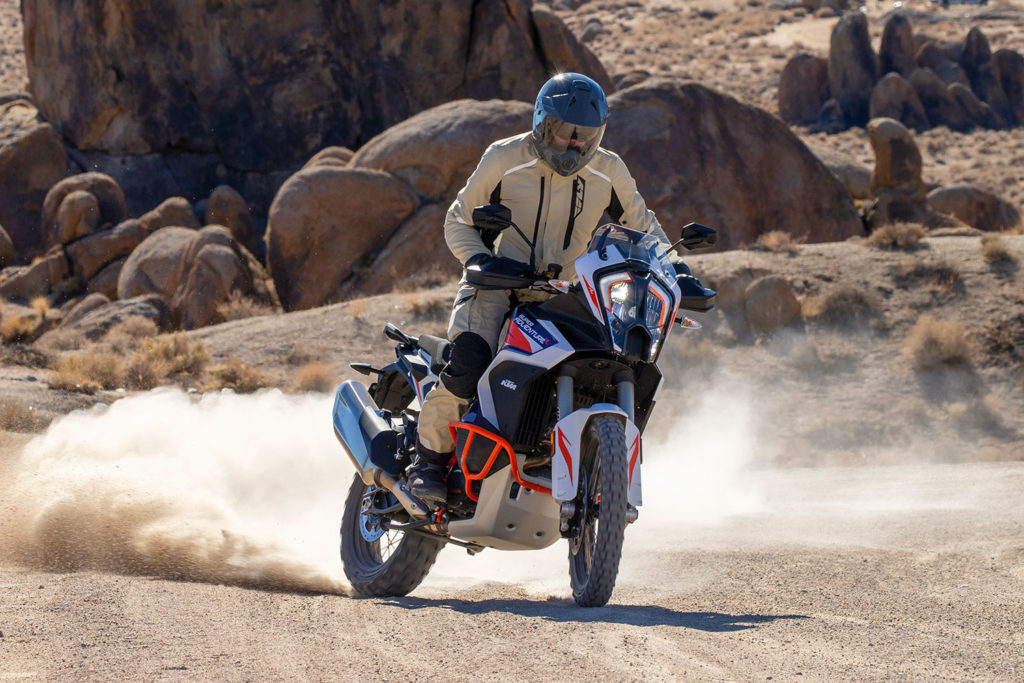
Sometimes there is a recognizable moment when you click with a motorcycle. That moment didn’t happen right away on the 2022 KTM 1290 Super Adventure R. It happened after we had already completed two days of testing and photography, burned 18 gallons of premium fuel, and redlined the KTM on Jett Tuning’s dyno.
That moment came on a Saturday, when I was out on a solo ride, winding my way through Los Padres National Forest on State Route 33. The 33 passes within earshot of my house, but it doesn’t get good for another 13 miles, when it starts to slither through a canyon carved by the Ventura River and enters Wheeler Gorge, which is so narrow that three tunnels had to be blasted through the rock to build the road. After climbing out of the gorge and passing a campground, Route 33 curves left in a big sweeper that’s like passing a bright-red neon sign that says GO FOR IT!
Check out Rider’s 2022 Motorcycle Buyers Guide
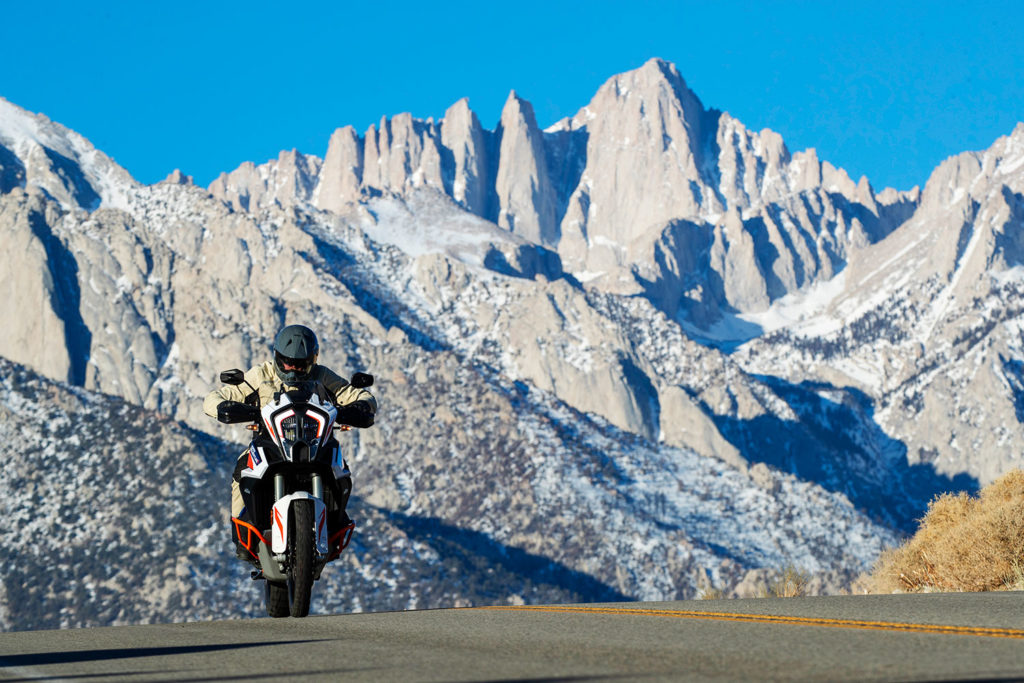
It was a cold, gray morning – just 43 degrees, according to the KTM’s temperature gauge. My fingers ached and I wished the bike had heated grips, but the engine and tires were up to temp. I thumbed a few buttons to switch from Street to Sport mode, gave the throttle a good twist, and felt the 1290 lunge forward.
Following the big sweeper is a series of constant-radius corners – right, left, right, left, right, left – that are like a racetrack with smooth pavement and familiar curves. I quickshifted down a couple gears, adjusted both body and throttle, and looked far ahead to each corner exit. As the last one opened onto a long straight, I gave it the whip. The big blocks of the Bridgestone Battlax Adventurecross AX41 tires squirmed as they found grip and the TC light flashed to let me know the electronics had things under control.
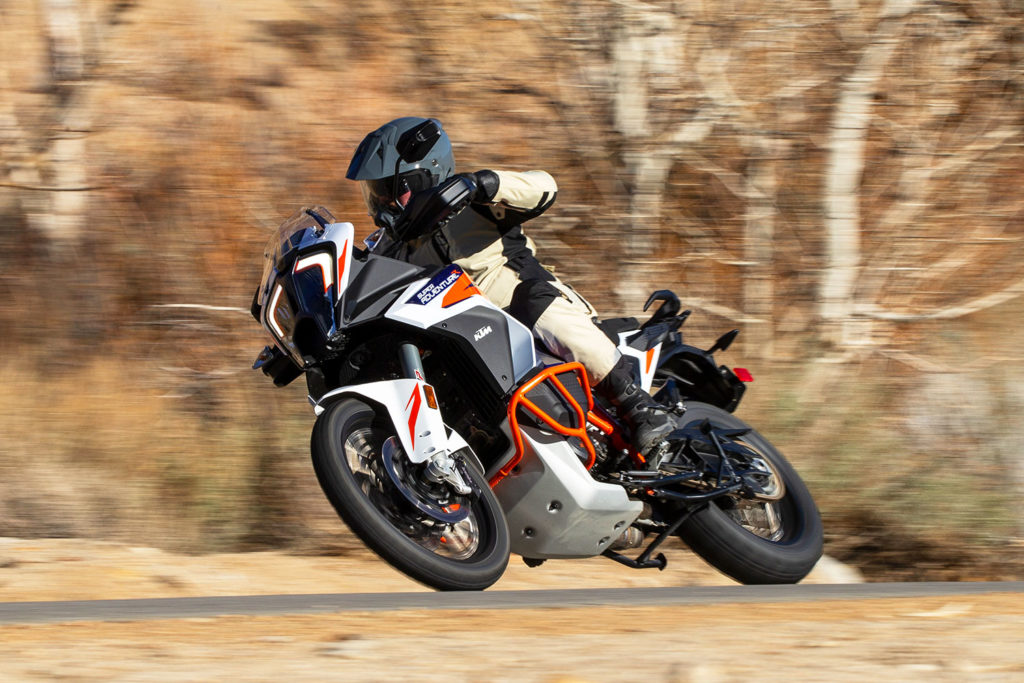
That was the moment. That was when a mix of satisfaction and heightened awareness combined into a mischievous smile that no one could see. When I realized that this – this right here – is what it’s all about.
Strong Bones
KTM’s 1290 Super Adventure platform includes two models: the street-focused 1290 Super Adventure S, which we tested a few years ago, and the off-road-ready R you see here. Both are built around the 1,301cc LC8 V-Twin, a versatile, powerful engine that’s also found in the 1290 Super Duke R naked bike.
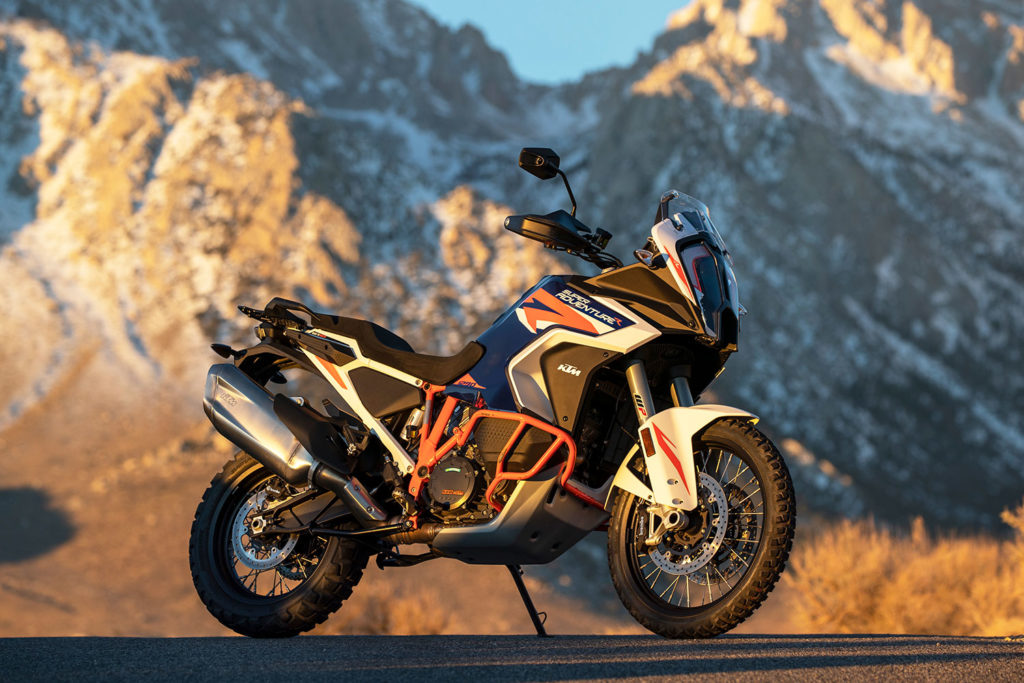
Refined over many years, the LC8 has been further updated to reduce weight and improve performance. Thinner crank-case walls and other internal changes shed 3.5 pounds of weight. Revised oil routing reduces friction losses, while new ignition coils and a centralized spark plug improve combustion. A new cooling system uses dual radiators to better dissipate engine heat. A revised and repositioned airbox allows the ram air intakes to work more efficiently. In front of the fuel tank is a new storage compartment, which can be removed by taking out four screws to easily access a new air filter with vertical ribs that help direct dust and dirt to the bottom of the airbox. A new Euro 5-compliant exhaust system has two headers, two catalytic converters, and three sensors, and a revised stainless-steel silencer reduces exhaust noise.
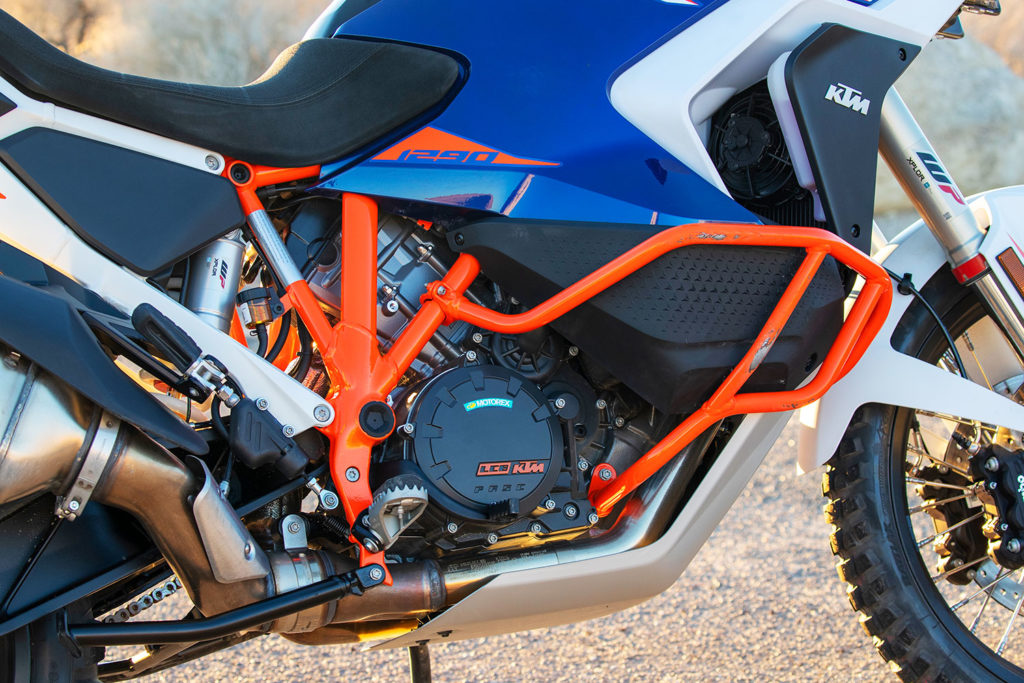
The 6-speed Pankl transmission has been reworked to provide shorter shifting action and smoother, faster gear changes, especially when using the optional quickshifter. The shift drum, now made of aluminum rather than steel, is lighter and machined with more precision. A new bronze coating on the shift forks reduces abrasion compared to the hard-chromed parts on previous models. New friction plates help the slip/assist clutch disengage easier at low speeds.
Holding the LC8 in place is a chromoly-steel trellis frame that uses the engine as a stressed member of the chassis. To improve weight distribution and agility, the steering head was moved back 15mm, the engine mounts were relocated, and the aluminum subframe was redesigned. A longer cast-aluminum swingarm, which has an open-lattice design to minimize weight, improves stability during acceleration.
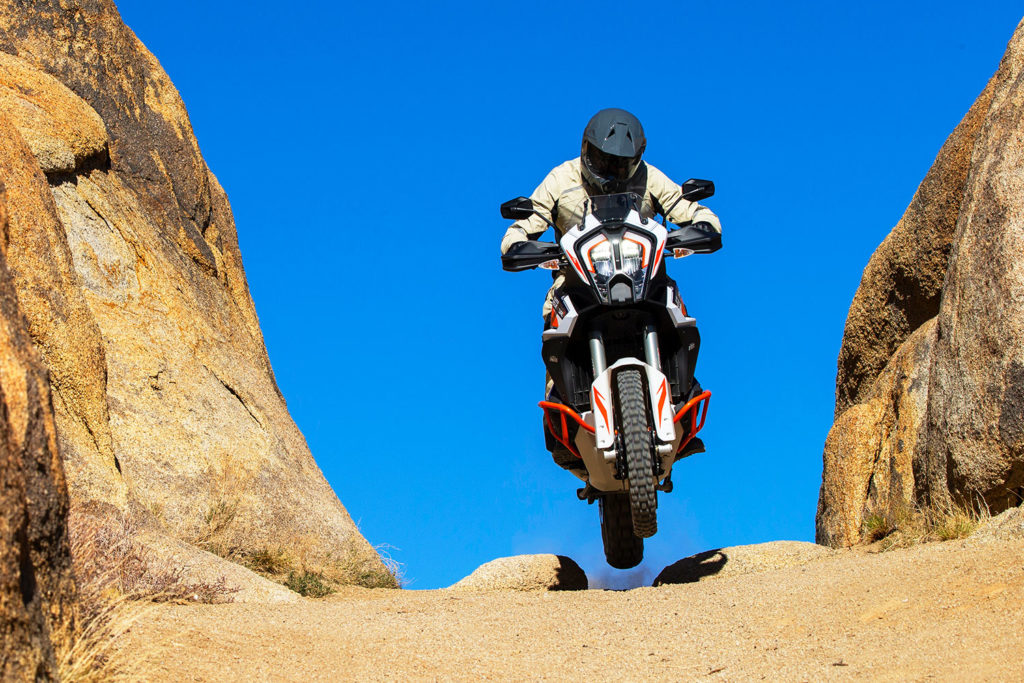
Zeros and Ones
We’re living in the digital age, and nearly every top-tier motorcycle has electronic features that allow the riding experience to be customized and enhanced. Equipped with throttle-by-wire and a new 6-axis IMU, the 1290 SA-R has ride modes (Sport, Street, Rain, and Off-road), dual-mode ABS (Road and Off-road), KTM’s Motorcycle Stability Control system, and cornering lights. The ride modes adjust engine output, throttle response, and lean-angle-sensitive traction control.
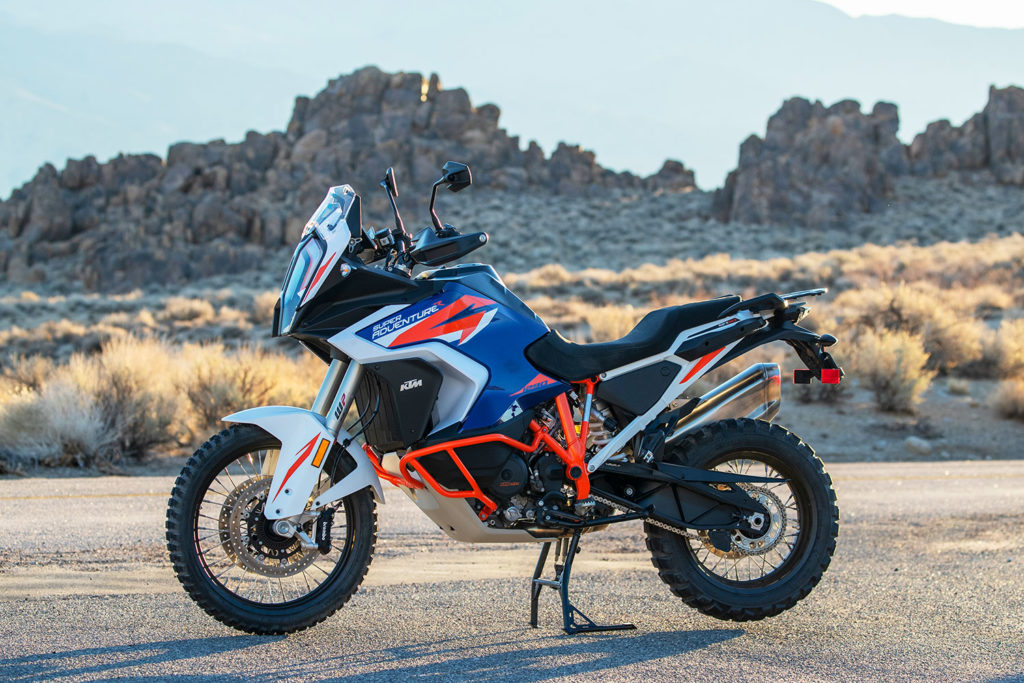
In full-power Sport mode, the 1290 produced 126 hp at 9,100 rpm and 88 lb-ft of torque at 8,000 rpm at the rear wheel on Jett Tuning’s dyno. Street mode offers the same level of power with less direct throttle response and more TC intervention. In limited-power Off-road mode, it made 81 horsepower at 6,600 rpm and 62 lb-ft of torque at 6,900 rpm. Rain mode offers the same power with softer throttle response and maximum TC intervention, whereas Off-road mode allows the greatest amount of rear-wheel spin among the four modes. (These dyno figures are down a few points because the knobby tread of the 40% on-road/60% off-road Bridgestone AX41 rear tire does not hook up as well as a more street-biased tire on a dyno’s rear drum.)
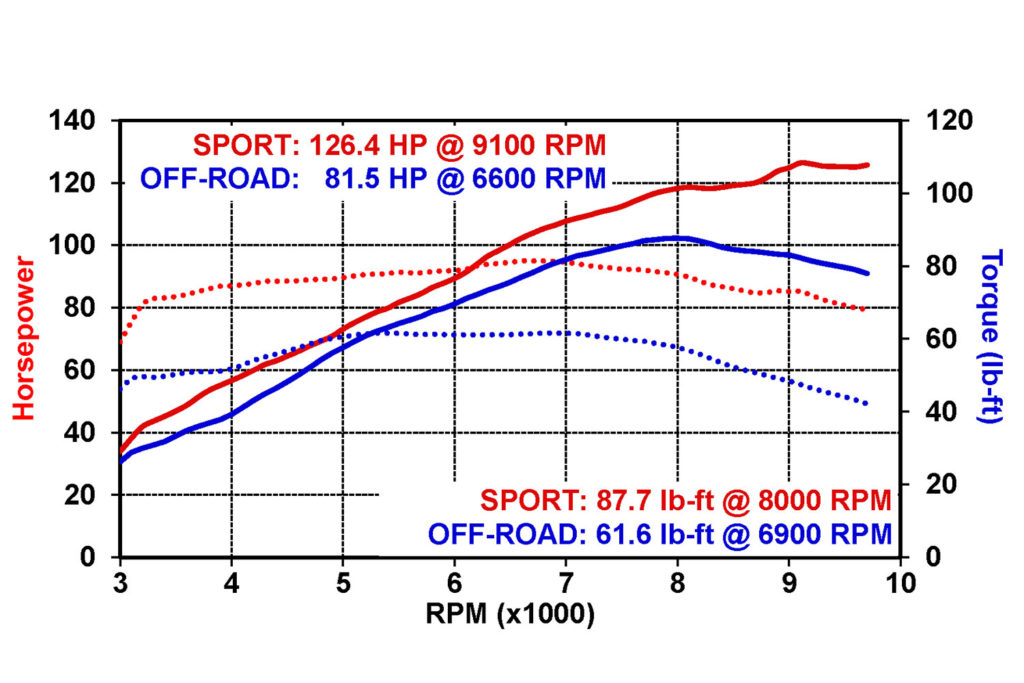
Our test bike was equipped with the optional Tech Pack ($749.99), which adds Rally mode, motor-slip regulation, hill-hold control, and the up/down Quickshifter+. Intended for aggressive off-road riding, Rally mode delivers full power and 1:1 throttle response, or it can be customized with maps from other ride modes. It also allows rear-wheel slip to be adjusted (levels 1-9) on the fly using up (+) and down (-) buttons on the left switchgear. The same buttons are used to set, resume, and adjust speed for cruise control, which is standard.
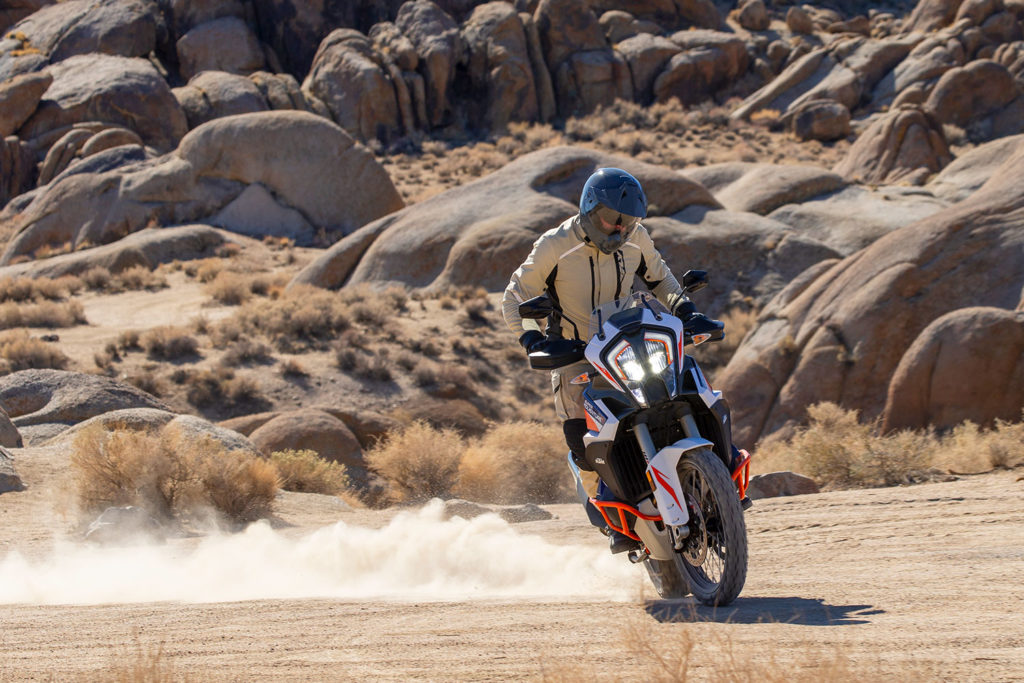
Rally mode also activates a special screen on the new, larger 7-inch color TFT display that shows slip level and gear position in extra-large numerals. On the TFT’s default and sub-menu screens, the information is shown using bold, vivid fonts and graphics. The angle of the TFT display can be adjusted, and the surface is scratch- and glare-resistant. It’s easy to read even in bright sunlight, and the background color automatically changes from white to black in low-light situations. KTM has always had an intuitive menu system, and it is now even easier to use, aided by redesigned switches.
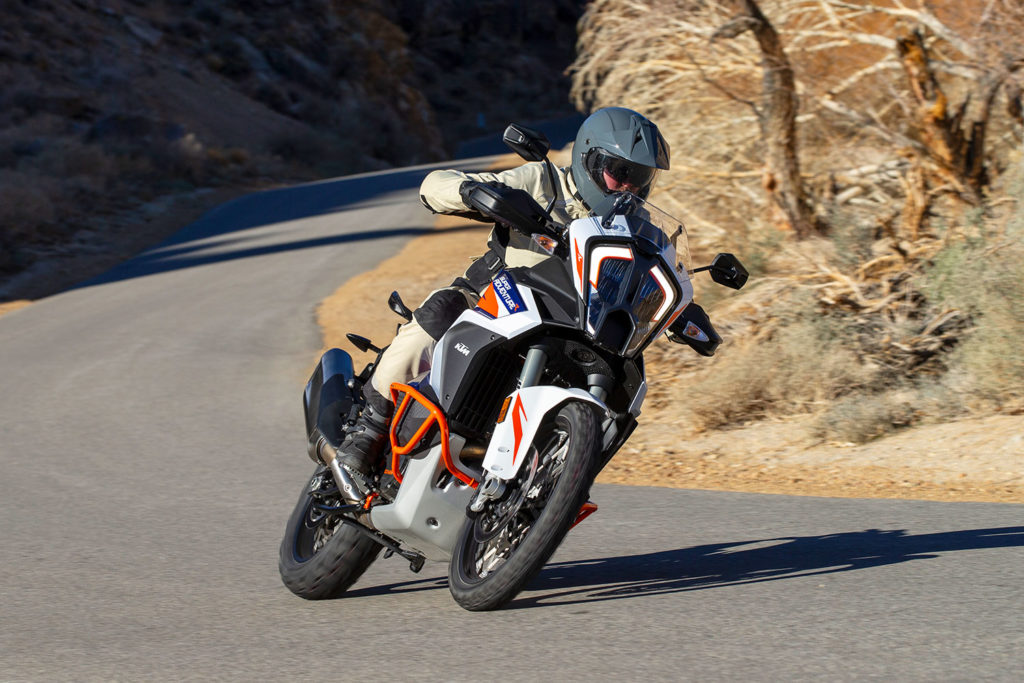
Greg’s Gear:
Helmet: Fly Racing Odyssey Adventure Modular
Jacket and Pants: Fly Racing Terra Trek
Gloves: Alpinestars Patro Gore-Tex
Boots: Forma Adventure
Bluetooth connectivity is available via the KTM MY RIDE smartphone app, which will display turn-by-turn navigation, mu-sic, and incoming calls on the TFT. The storage compartment in front of the fuel tank is waterproof and has a USB charging port, though it cannot be locked. KTM’s keyless Race On system, which uses a remote fob to turn on the bike, lock/unlock the steering, and open the gas cap, offers extra security with a new Anti-Relay Attack mode.
Heading for the Hills
The 1290 Super Adventure R is KTM’s top-dog ADV for the dirt, but like any adventure bike in the open-class segment, most of its miles will be logged on pavement. That’s why it has Sport, Street, and Rain ride modes, a Road ABS mode, cruise control, and removable rubber inserts in its cleated footpegs. Although the new Bridgestone AX41 tires have an off-road bias, the big-block tread rolls smoothly on the road with minimal noise and provides decent cornering grip.
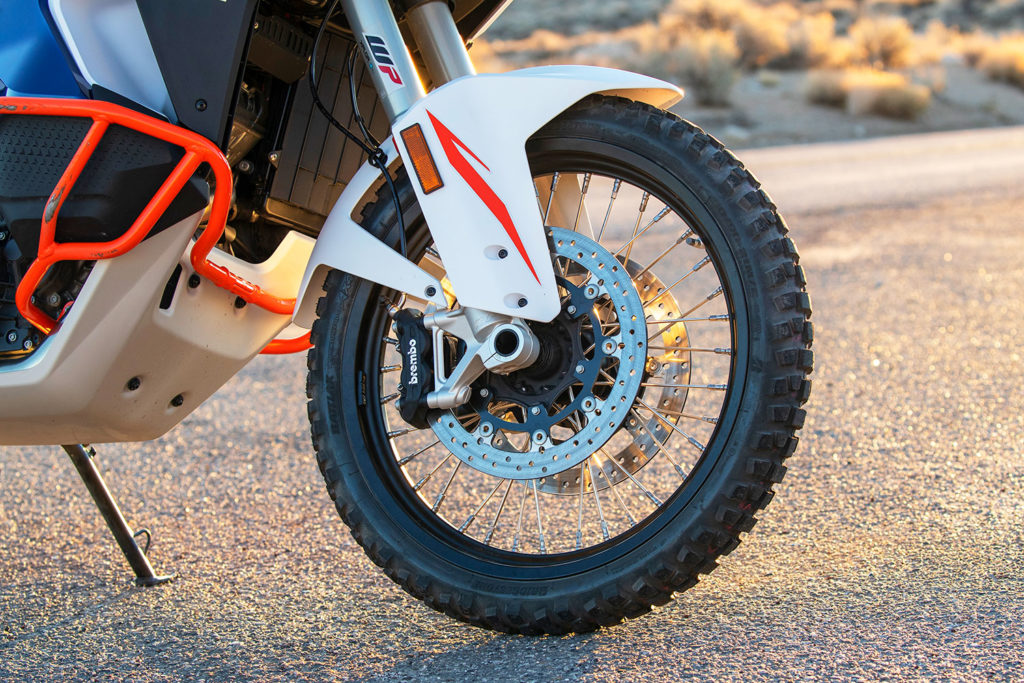
With photographer Kevin Wing on my six, we rode more than 200 paved miles to reach Lone Pine, a high-desert town that sits at 3,700 feet in California’s Owens River valley. A few miles to the west, the Sierra Nevada range forms a jagged wall that towers more than 10,000 feet above the valley floor. On a clear day, standing just about anywhere in Lone Pine provides an unobstructed view of 14,505-foot Mount Whitney, the highest peak in the lower 48 states.
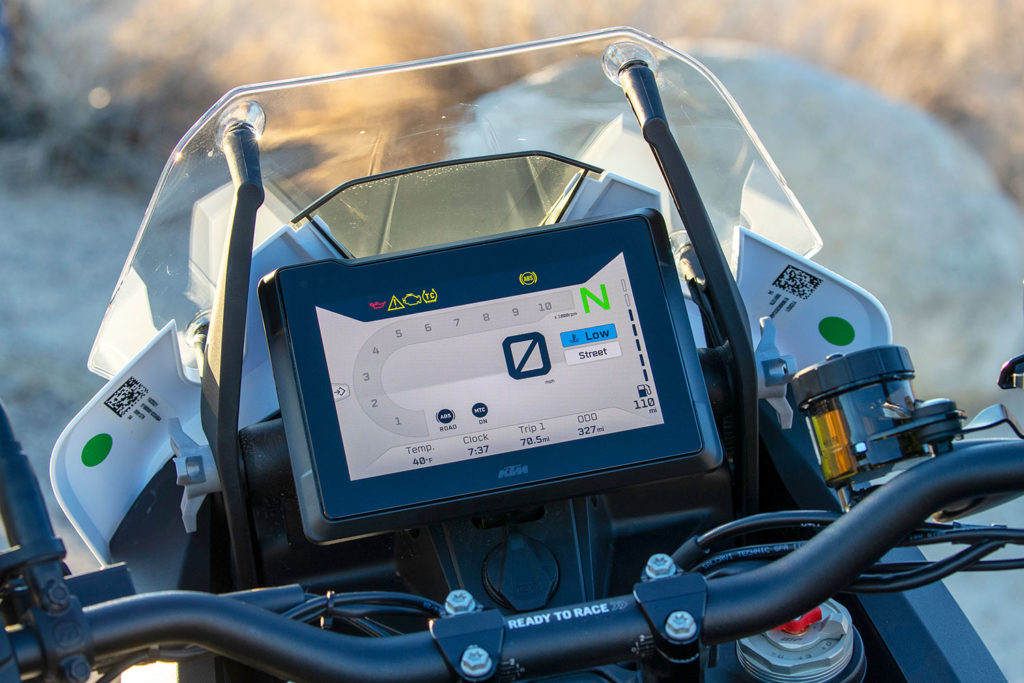
We were battered by severe headwinds on the ride to Lone Pine. The KTM’s short, rally-style windscreen, which can be hand-adjusted up a couple inches, provides only modest wind protection. Handguards are standard, and the lower pods of the horseshoe-shaped fuel tank (a design also used on the 890 Adventure) provides some lower body protection. Wrapped around the new tank is fresh bodywork with large exit vents for the dual radiators. With most of the fuel located in the pods on either side of the engine, the upper tank area was made slimmer to facilitate stand-up riding.
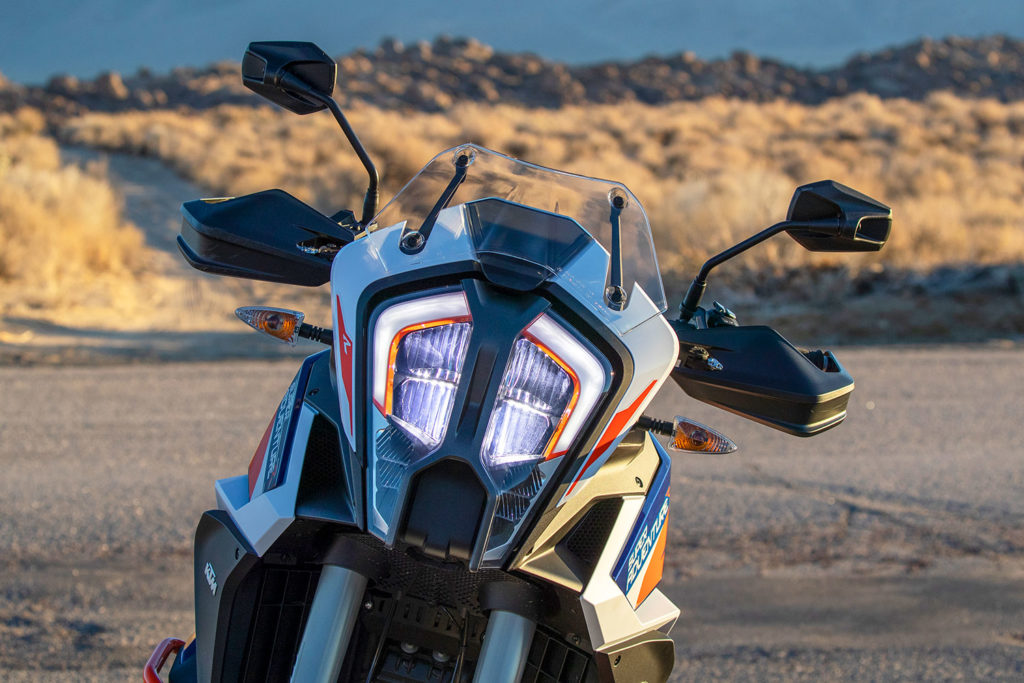
The two-up seat was also redesigned. It has firm, supportive padding and grippy cover material, and the height of the pi-lot’s portion was lowered from 35 to 34.6 inches. Behind the pillion seat is a sturdy aluminum luggage rack with integrated passenger grab handles. The rack provided a convenient place to mount Nelson-Rigg’s 30-liter Hurricane Waterproof Backpack/Tail Pack to carry my gear.
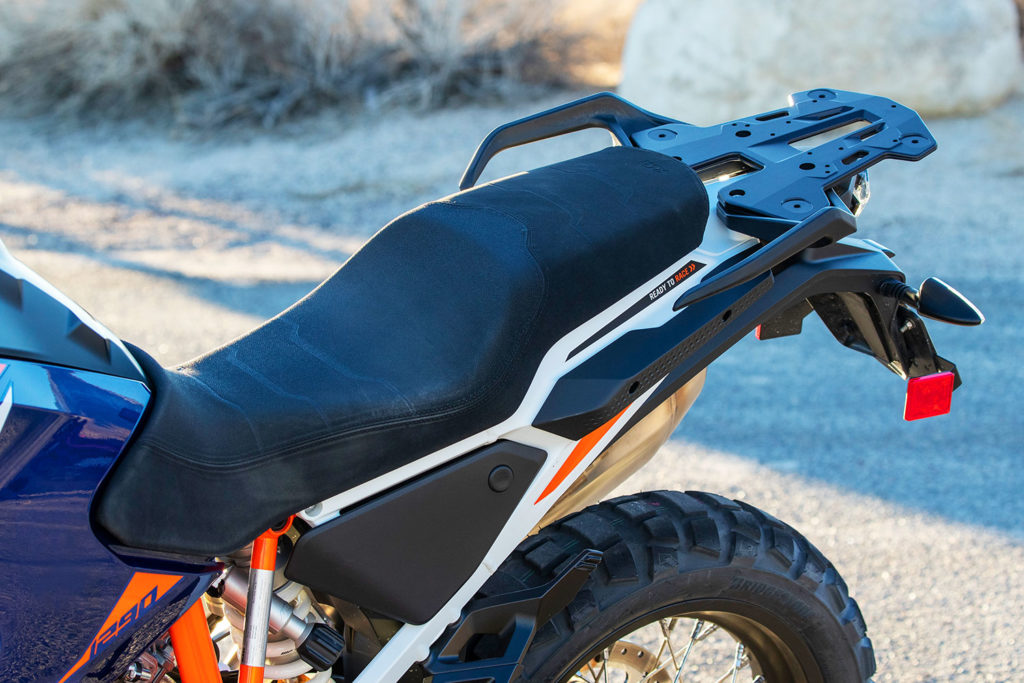
As with many full-size adventure bikes, the KTM has a spacious cockpit with an upright seating position, generous legroom, and a comfortable reach to its wide, tapered aluminum handlebar. Seat height is fixed, but handlebar position, clutch and brake lever reach, and gear shifter and brake pedal height can all be adjusted to suit different riders.
Gettin’ Dirty
In the rolling foothills between Lone Pine and the Sierra Nevada lay the Alabama Hills, a group of rock formations that for many years has been a popular filming location for westerns and other movies. The area is crisscrossed with sandy roads and trails, making it an ideal place to evaluate the 1290’s off-road chops. Before leaving the pavement, I aired down the AX41 tires from the recommended 35/42 psi to 30 psi at both ends for better traction. The TFT’s bike info screen shows a schematic of the 1290, and at the lower pressure the wheels changed from green to red and the tire-pressure-monitoring system issued a warning (which can be cleared by pressing a button). To maximize off-road capability as well as tire choices, the 1290 has a 21-inch front and 18-inch rear wheelset. Spoked aluminum rims are made by Alpina, and they have an O-ring seal system that accommodates tubeless tires.
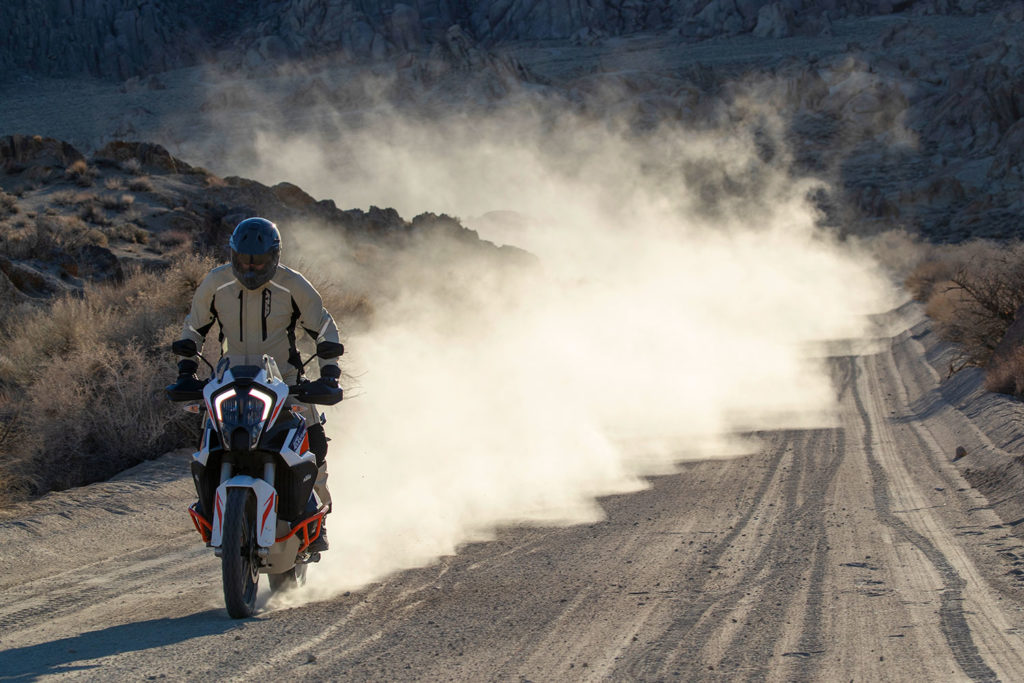
Riding an adventure bike off-road, especially a powerful one that weighs 539 pounds, comes with abuse. Tubular-steel lower crash bars and a big skid plate are standard equipment, as are a centerstand and integrated mounts for optional saddlebags. The 1290’s greatest asset for off-road riding is its WP XPLOR suspension, which was originally developed for and is still used on KTM’s EXC enduro models. The fully adjustable setup offers 8.7 inches of travel at both ends (ground clearance is 9.5 inches). The 48mm inverted fork has compression in the right leg and rebound in the left, both easily adjustable with dials on the fork caps. Out back, a PDS (Progressive Damping System) monoshock offers both low- and high-speed compression, rebound, and a remote preload adjuster. Damping settings were revised to provide greater control, and the rear shock now offers more bottoming resistance.
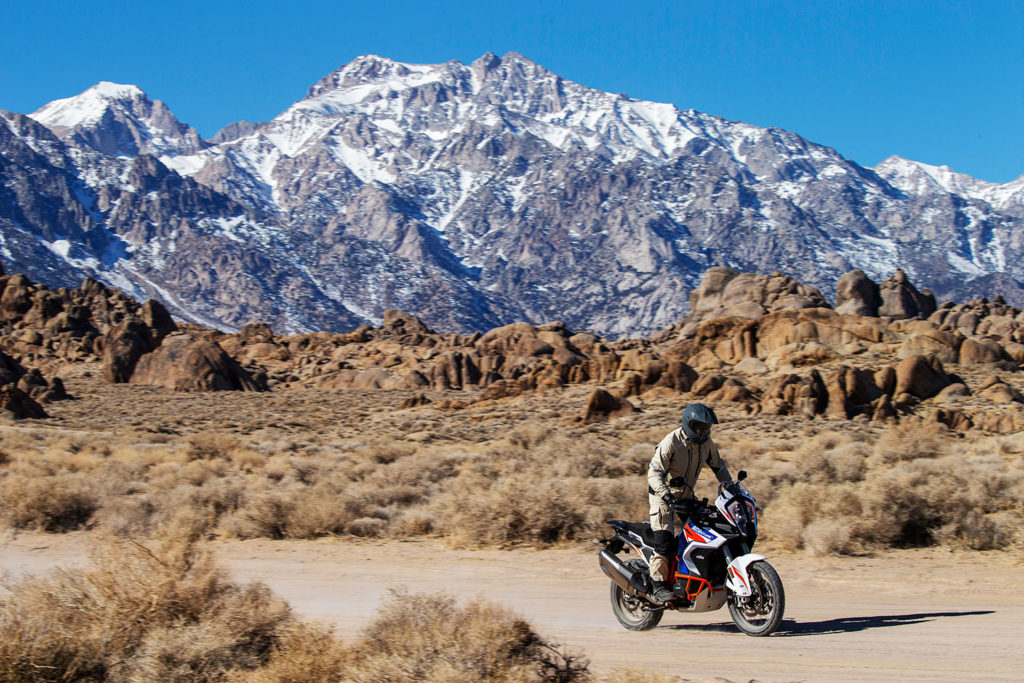
The high-quality suspension is incredibly forgiving. It compensates for mistakes and minimizes drama, absorbing hits big and small to keep the chassis from getting out of shape. The 1290 also has a steering damper made by WP, which helps keep front wheel deflections from becoming white-knuckle headshakes. When riding a big ADV off-road, it pays to be judicious with line choice, but soft sand, ruts, and other obstacles often have other plans. Time and again, the 1290 allowed for corrections to be made or dealt with the unexpected in a way that translated into trust and confidence.
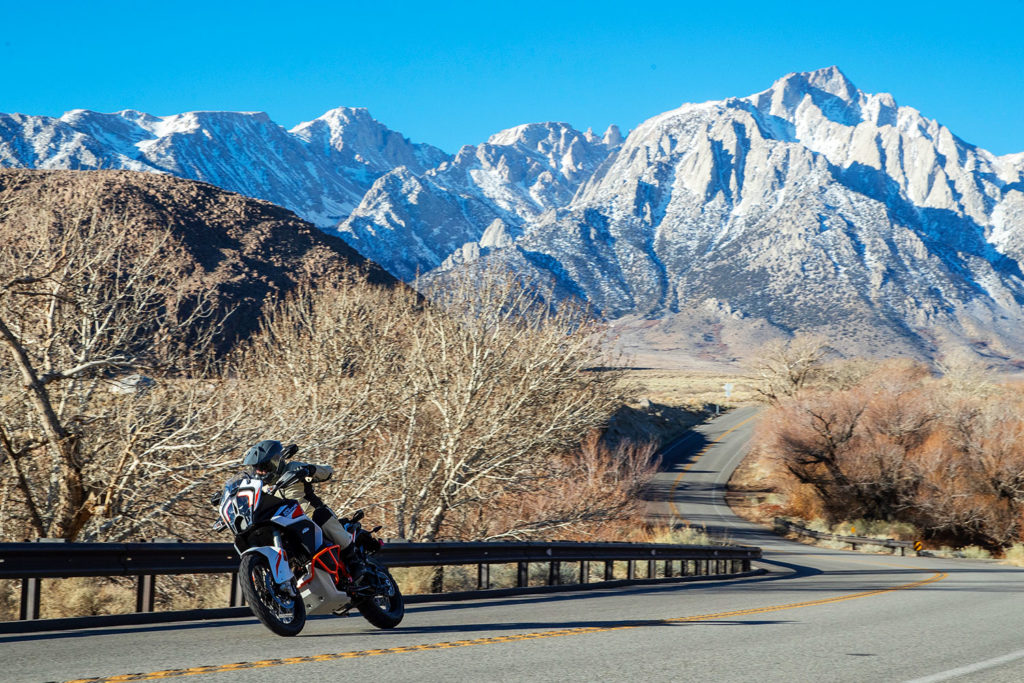
On one long stretch of two-track in the Carrizo Plain National Monument, I was up on the pegs and humming along at speed when the road beneath me suddenly disappeared. A small gully had snuck up on me, and I launched off the lip and landed hard on the opposite face. The suspension fully compressed but didn’t bottom out abruptly, and the bike stayed on course. I was chastened by my oversight but relieved by the outcome.
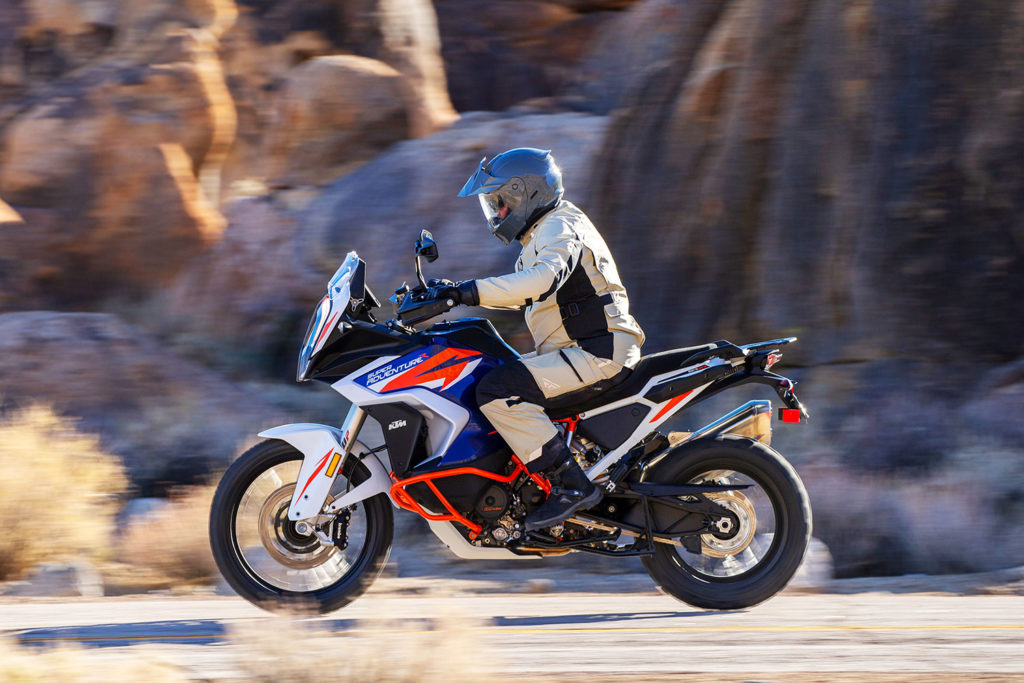
The 1290’s Off-road and Rally ride modes, especially the latter’s adjustability for throttle response and rear-wheel spin (it also turns off wheelie control), allow the engine’s power to be tailored to conditions. With a linear power curve and a flat torque spread, it’s easy to dial in just what you need for big powerslides or to slowly navigate a tricky rock garden. The slip/assist clutch provides good feel at the lever, the quickshifter simplifies gear changes, and the Off-road ABS allows the rear wheel to be locked up as needed.
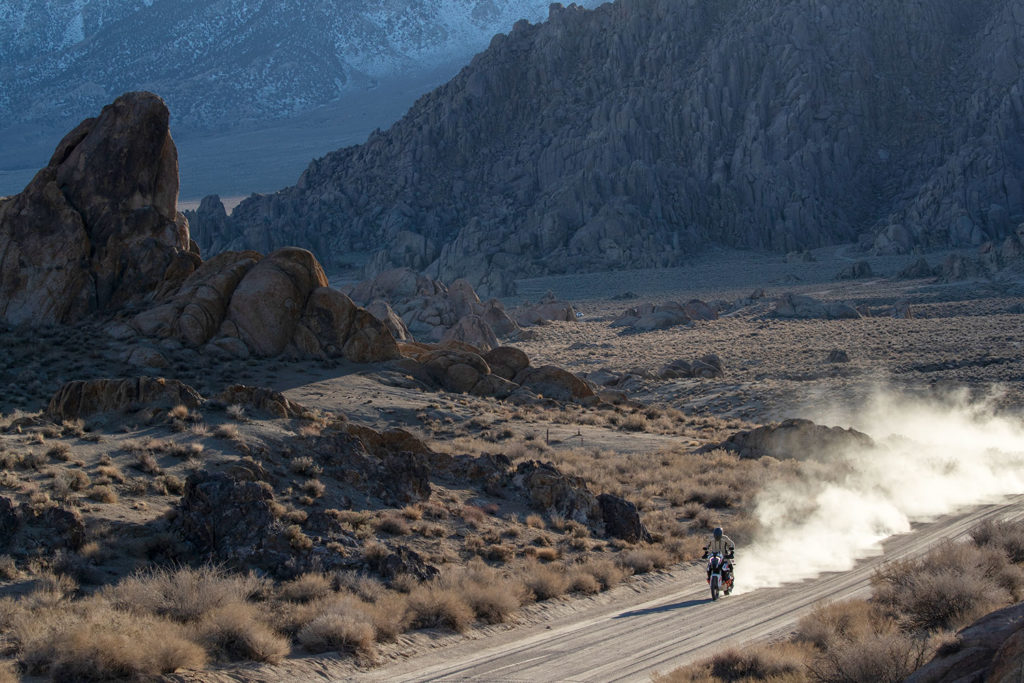
Destination Unknown
As good as the 1290 Super Adventure R is off-road, it’s also highly capable and an absolute blast to ride on paved backroads. Those who don’t plan to do much off-road exploring will get more mileage and better grip out of a set of 90/10 adventure tires, but the 40/60 Bridgestones allow deep lean angles and provide good straight-line stability.
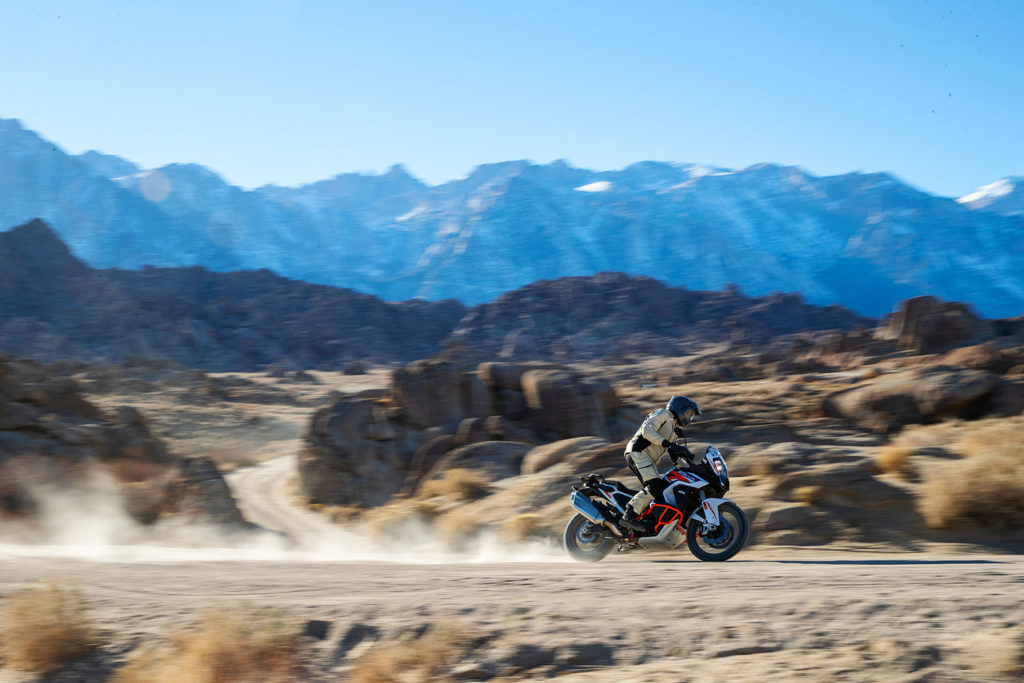
The appeal of adventure bikes is their ability to do it all. You could mount luggage on the 1290 and ride solo or with a passenger to the nearest campground or clear across the country. Its 6.1-gallon tank encourages long rides between fuel stops. Over the course of our 1,000-mile test, we averaged 36.4 mpg and 222 miles of range. With headwinds on the free-way and aggressive on- and off-road riding, fuel economy dipped as low as 30 mpg (184 miles). In mellower conditions, we got 44.3 mpg (271 miles).
Once you arrive at your destination, you can drop the luggage and explore what begins when the pavement ends. No, you can’t ride a big ADV like it’s a dual-sport. But with a little restraint and sound judgment, the 1290 Super Adventure R can take you to places well off the beaten path. There are more than one million miles of unpaved roads in this country and millions more beyond our borders. What are you waiting for?
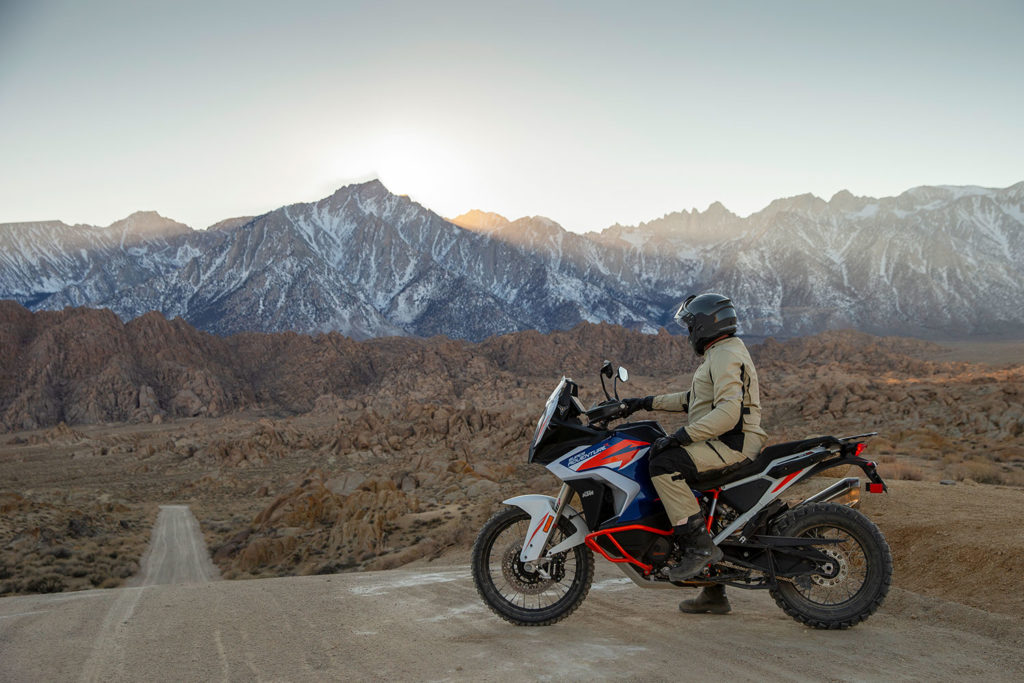
2022 KTM 1290 SUPER ADVENTURE R SPECS
Base Price: $19,499
Price as Tested: $20,249 (Tech Pack)
Warranty: 1 yr., 12,000 miles
Website: ktm.com
ENGINE
Type: Liquid-cooled, transverse 75-degree V-Twin, DOHC w/ 4 valves per cyl.
Displacement: 1,301cc
Bore x Stroke: 108 x 71mm
Compression Ratio: 13.1:1
Valve Insp. Interval: 18,600 miles
Fuel Delivery: Keihin EFI w/ 52mm throttle bodies x 2
Lubrication System: Dry sump, 3.8 qt. cap.
Transmission: 6-speed, hydraulically actuated slip/assist wet clutch
Final Drive: X-ring chain
CHASSIS
Frame: Chromoly steel trellis w/ engine as stressed member, aluminum subframe & cast aluminum swingarm
Wheelbase: 61.3 in.
Rake/Trail: 25.3 degrees/4.4 in.
Seat Height: 34.6 in.
Suspension, Front: 48mm inverted fork, fully adj. w/ 8.7 in. travel
Rear: Single PDS shock, fully adj. w/ 8.7 in. travel
Brakes, Front: Dual 320mm floating discs w/ 4-piston radial calipers & ABS
Rear: Single 267mm floating disc w/ 2-piston caliper & ABS
Wheels, Front: Spoked tubeless, 2.50 x 21 in.
Rear: Spoked tubeless, 4.25 x 18 in.
Tires, Front: 90/90-21
Rear: 150/70-18
Wet Weight: 539 lbs.
Load Capacity: 453 lbs.
GVWR: 992 lbs.
PERFORMANCE
Horsepower: 126.4 hp @ 9,100 rpm (rear-wheel dyno, Sport mode)
Torque: 87.7 lb-ft @ 8,000 rpm (rear-wheel dyno, Sport mode)
Fuel Capacity: 6.1 gals.
Fuel Consumption: 36.4 mpg
Estimated Range: 222 miles








Not a fan of Alpina wheels. Take one point of failure and introduce another 80 with the potential of airleaks at all the spokes. Had them one bike. The rear wheel had three leaky spokes inside of four years.
Wow 126 horsepower is quite a bit less than claimed. But all these bikes are testing out like that they need to change what they claim.
Manufacturers’ horsepower and torque claims are measured at the crankshaft, not the rear-wheel. We have motorcycles dyno tested on a Dynojet dynamometer that measures horsepower and torque at the rear wheel. Drivetrain losses (transmission, clutch, final drive, etc.) reduce power at the rear wheel by 10-20%, depending on the specific model. Since KTM claims 160 hp at the crank, we can expect 128-144 hp at the rear wheel. As we noted in this review, “These dyno figures are down a few points because the knobby tread of the 40% on-road/60% off-road Bridgestone AX41 rear tire does not hook up as well as a more street-biased tire on a dyno’s rear drum.” So the 126 hp figure we recorded is on target.
you are correct, everyone else is wrong. bikes are dyno’ing WAY less than claimed. 10-11% is the typical drivetrain losses, ie a 200hp crank bike should and does dyno approx 178-180hp.
I too think the 1290 SAR makes way less horsepower than claimed – I race my brother’s 890 regularly full throttle from standstill to TMAX on my 2021 1290 SAR – up to 100mph there’s very little in it, the 1290 pulls on it – but doesn’t drop it until you’re past 100mph. Okay it’s heavier but there’s no way it has 40-45 more bhp – more like 20. 130 at the rear wheel sounds and feels about right. When we swap bikes the result is the same, so it’s not a rider issue! The 890 stops accelerating at 130mph – the 1290 at 145. Electronically limited me thinks.